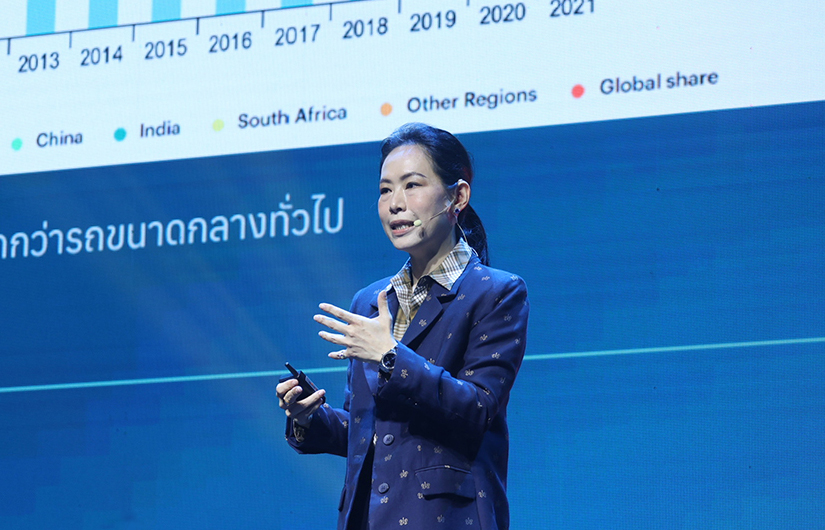Chanapun Juangroongruangkit, Senior Vice President of Thai Summit Group,
spoke at a one-day seminar, “ESG Game Changer”
Many now say that CSR, Corporate Social Responsibility, is evolving into ESG, an Environmental, Social, Governance framework that companies are now implementing to achieve sustainability and ethical business practices that will benefit society.
Recently, Chanapun Juangroongruangkit, Senior Vice President of Thai Summit Group, a leading automobile parts manufacturer in Asia, spoke at a one-day seminar, “ESG Game Changer”, hosted by Prachachat Turakit, a member of the Matichon Group, on the topic, “The Need to Transform to Stay Ahead”.
She began her talk by reminding the audience on how transportation has evolved in Thailand from water transport in the past to now fossil fuel burning internal combustion engines (ICE). This she said has led to the country producing as much as 350 million tons of greenhouse emissions, or CO2, annually. However, through the introduction of electric public transport and private vehicles and manufacturers cleaning up their operations, we are now seeing a steady reduction in these emissions. Hopefully by 2030, these levels will have been reduced by 30%.
Khun Chanapun then went on to discuss the seven challenges of ESG implementation: 1) Climate, to achieve net zero air pollution; 2) Circular Economy, transitioning from a linear to circular framework; 3) Resources & Biodiversity, to become nature positive; 4) Responsible Supply Chain, every member acting in a responsible ESG manner; 5) Sustainable Finance, or green finance, 6) Integrated Steering & Reporting, based on ESG, and 7) Sustainability meets Digitalization, to achieve ‘true’ value contribution.

She also explained how investment on sustainability initiatives as a percentage of revenue by companies before Covid-19 in 2019 has still not reached post pandemic levels after restrictions began to be lifted in 2022, which is true for OEM (Original Equipment Manufacturers) automobile assemblers, but not for suppliers that have now surpassed the industry’s average.
Khun Chanapun later mentioned that the automotive and parts industry must focus on three key elements: the production of great vehicles, the protection of our planet and the sustainability and strengthening of their businesses. This means transitioning manufacturing and operations to the production of electric vehicles (EVs) and their required components, beginning with batteries, which currently account for up to a third of an EVs cost. This is something they are working to lower. Currently, according to Bloomberg, investment in battery manufacturing is between $150-$200 per kWh (kilowatt hour), which they want to reduce by half by 2025-2030 as their attention turns more and more away from fossil fuel driven engines.
All it was told, EV usage is cleaner than ICE vehicles. However, EV manufacturing is still emitting more CO2 than that of ICE vehicles. So, this is a place to begin. As the transition continues, old ICE cars must be used to be recycled when unused. This will have to be the same for EVs in the coming years, particularly their batteries and electrical systems.
By switching to cleaner operating vehicles and their manufacturing as well as expanding the Green Charging infrastructure, it is hoped that by 2050, emissions will be reduced by 75%.
As EV batteries come to their End of Life (EOL), a separation system will have to be introduced to determine which batteries and their parts can be reused, recycled or taken apart for material recovery, incinerated or just disposed of.
Already countries around the world are enacting legislations and regulations for global zero-emission mandates and ICE bans from now until 2050 with Denmark the first to ban ICE low-duty vehicles in 2030, followed by Chile in 2035 and Argentina in 2040.
To achieve this transition and stay at the forefront in the automotive and parts manufacturing industries, Khun Chanapun says that all players must collaborate through the ESG framework. Consumers must also join in these efforts to achieve sustainability. They must be willing to pay a slightly higher cost for an electric vehicle by considering the value added benefits, lower cost for daily operation and a cleaner environment. They should also consider using electric public transport, especially as the BTS, MRT and SRT mass transit systems are continually being expanded, and new electric buses, ferries, taxis, tuk-tuks, motorbikes and scooters are replacing ICE transports.
She concludes by saying that it is only through the efforts of all, government agencies and private companies, together with the Thai, ASEAN and global citizenry, that we can save and sustain our planet and its resources for future generations.
Credit Photo by Prachachat




















































































































































































































































































































































































































































































































































































































































































































































































































